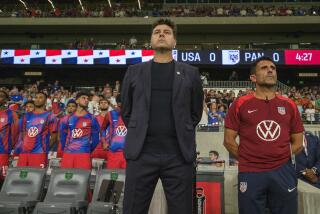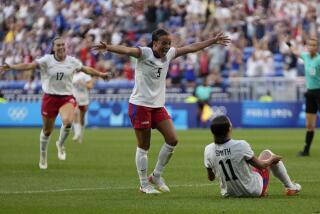World Cup: U.S. will try to knock out Ghana and bad memories
Reporting from Pretoria, South Africa — Four years and four days later, the unpleasant memories come flooding back for half a dozen U.S. players.
Landon Donovan, Carlos Bocanegra, DaMarcus Beasley, Steve Cherundolo, Clint Dempsey and Oguchi Onyewu were all on the field on that dismal German afternoon of June 22, 2006, when Ghana knocked the U.S. out of the last World Cup with a 2-1 decision.
On Saturday night in Rustenburg, the teams square off again, this time in the knockout stage — it’s win or go home — with a place in the quarterfinals on the line. First, however, the ghosts of 2006 have to be banished.
The ill-tempered game in Nuremburg was decided in 10 frantic minutes at the end of the first half.
Ghana had taken the lead midway through the half. The U.S. lost captain and playmaker Claudio Reyna to injury five minutes before the half ended but still managed to tie the score on Dempsey’s goal off a Beasley cross three minutes later.
Two minutes into injury time at the end of the half, Onyewu and Ghana forward Razak Pimpong clashed over the ball, German referee Markus Merk ruled that Onyewu had committed a foul and Ghana scored the game-winner on the resulting penalty kick.
The controversial penalty is still a sore point with the U.S.
“That was not a good day, for me or for the team,” Donovan said. “What I remember most personally is my tentativeness and the immediate feeling afterward of the finality of it and how disappointing that was.”
Michael Essien was a towering figure on Ghana’s 2006 team but is missing this World Cup because of injury. Even so, Donovan said the Black Stars present a formidable challenge.
“I’ve been impressed with them,” he said. “I thought they would struggle a little bit without Essien, but I think they’ve looked very good and they’re going to be very difficult to play against. Like a lot of African teams, they’re fairly unpredictable sometimes, so that could be a plus or a minus.”
With the Ivory Coast having been eliminated Friday, Ghana is Africa’s last standard-bearer in the tournament, something that is likely to swing neutral fans in the Black Stars’ direction.
“My guess is they’ll have quite a bit of support,” Donovan said. “It’s hard to know what the game will look like from that standpoint, but that’s beyond our control. I think the South African people have really taken to us, and seeing their support has been fantastic. I expect the same on Saturday.”
According to goalkeeper Tim Howard, the pressure is off the U.S. players because they have accomplished their initial goal of getting out of the first round. The knockout stage of the competition opens other possibilities.
“It’s easier to play the Ghana game,” he said. “We can draw the game, we can take it into extra time, we can go to penalties. There are so many formulas that can happen, whereas we knew [in the must-win Algeria match] there was only one result that could get us through. That’s a lot more pressure.”
Bob Bradley, the U.S. coach, described Ghana as “a talented team, an athletic team, mobile. We know some of their guys pretty well. We’ve watched them a lot.”
Ghana has scored only two goals in its first three matches, both of them on penalty kicks by Asamoah Gyan, a teammate of U.S. defender Bocanegra at Rennes in France.
Otherwise, the Blacks Stars’ forwards have so far failed to produce, although, as defender John Pantsil said, “We are going to speak to our strikers so that they can be more effective.”
Bradley could start Onyewu again on defense after resting him against Algeria. The motivation will be there for the center back after the penalty kick in 2006.
Apart from that, the U.S. is looking ahead, possibly to a quarterfinal meeting with Uruguay or South Korea.
“I’ve already put that [2006] behind me,” Donovan said. “This is a chance to do something very special.”







